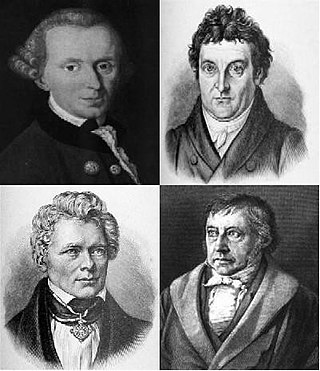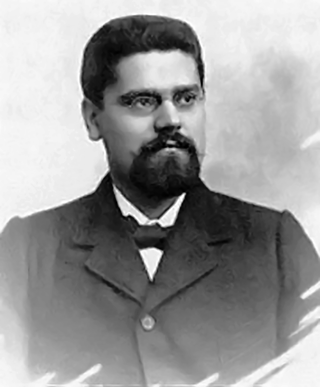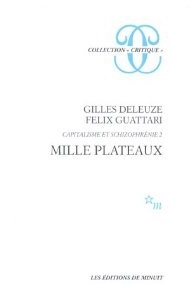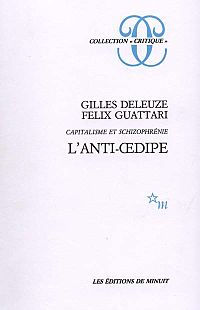Related Research Articles

Gilles Louis René Deleuze was a French philosopher who, from the early 1950s until his death in 1995, wrote on philosophy, literature, film, and fine art. His most popular works were the two volumes of Capitalism and Schizophrenia: Anti-Oedipus (1972) and A Thousand Plateaus (1980), both co-written with psychoanalyst Félix Guattari. His metaphysical treatise Difference and Repetition (1968) is considered by many scholars to be his magnum opus.
Substance theory, or substance–attribute theory, is an ontological theory positing that objects are constituted each by a substance and properties borne by the substance but distinct from it. In this role, a substance can be referred to as a substratum or a thing-in-itself. Substances are particulars that are ontologically independent: they are able to exist all by themselves. Another defining feature often attributed to substances is their ability to undergo changes. Changes involve something existing before, during and after the change. They can be described in terms of a persisting substance gaining or losing properties. Attributes or properties, on the other hand, are entities that can be exemplified by substances. Properties characterize their bearers; they express what their bearer is like.
The distinction between subject and object is a basic idea of philosophy.

German idealism is a philosophical movement that emerged in Germany in the late 18th and early 19th centuries. It developed out of the work of Immanuel Kant in the 1780s and 1790s, and was closely linked both with Romanticism and the revolutionary politics of the Enlightenment. The period of German idealism after Kant is also known as post-Kantian idealism or simply post-Kantianism. One scheme divides German idealists into transcendental idealists, associated with Kant and Fichte, and absolute idealists, associated with Schelling and Hegel.
The doctrine or theory of immanence holds that the divine encompasses or is manifested in the material world. It is held by some philosophical and metaphysical theories of divine presence. Immanence is usually applied in monotheistic, pantheistic, pandeistic, or panentheistic faiths to suggest that the spiritual world permeates the mundane. It is often contrasted with theories of transcendence, in which the divine is seen to be outside the material world.
Schizoanalysis is a set of theories and techniques developed by philosopher Gilles Deleuze and psychoanalyst Félix Guattari, first expounded in their book Anti-Oedipus (1972) and continued in their follow-up work, A Thousand Plateaus (1980).

The Critique of Pure Reason is a book by the German philosopher Immanuel Kant, in which the author seeks to determine the limits and scope of metaphysics. Also referred to as Kant's "First Critique", it was followed by his Critique of Practical Reason (1788) and Critique of Judgment (1790). In the preface to the first edition, Kant explains that by a "critique of pure reason" he means a critique "of the faculty of reason in general, in respect of all knowledge after which it may strive independently of all experience" and that he aims to decide on "the possibility or impossibility of metaphysics". In this context, a "critique" means a systematic analysis, rather than finding fault, unlike the term's colloquial use.
In logic and philosophy, a property is a characteristic of an object; a red object is said to have the property of redness. The property may be considered a form of object in its own right, able to possess other properties. A property, however, differs from individual objects in that it may be instantiated, and often in more than one object. It differs from the logical/mathematical concept of class by not having any concept of extensionality, and from the philosophical concept of class in that a property is considered to be distinct from the objects which possess it. Understanding how different individual entities can in some sense have some of the same properties is the basis of the problem of universals.

Actual idealism is a form of idealism, developed by Giovanni Gentile, that grew into a "grounded" idealism, contrasting the transcendental idealism of Immanuel Kant, and the absolute idealism of G. W. F. Hegel. To Gentile, who considered himself the "philosopher of fascism" while simultaneously describing himself as liberal and socialist, actualism was presented the sole remedy to philosophically preserving free agency, by making the act of thinking self-creative and, therefore, without any contingency and not in the potency of any other fact.
In philosophy, transcendence is the basic ground concept from the word's literal meaning, of climbing or going beyond, albeit with varying connotations in its different historical and cultural stages. It includes philosophies, systems, and approaches that describe the fundamental structures of being, not as an ontology, but as the framework of emergence and validation of knowledge of being. These definitions are generally grounded in reason and empirical observation and seek to provide a framework for understanding the world that is not reliant on religious beliefs or supernatural forces. "Transcendental" is a word derived from the scholastic, designating the extra-categorical attributes of beings.

A Thousand Plateaus: Capitalism and Schizophrenia is a 1980 book by the French philosopher Gilles Deleuze and the French psychoanalyst Félix Guattari. It is the second and final volume of their collaborative work Capitalism and Schizophrenia. While the first volume, Anti-Oedipus (1972), was a critique of contemporary uses of psychoanalysis and Marxism, A Thousand Plateaus was developed as an experimental work of philosophy covering a far wider range of topics, serving as a "positive exercise" in what Deleuze and Guattari refer to as rhizomatic thought.

Anti-Oedipus: Capitalism and Schizophrenia is a 1972 book by French authors Gilles Deleuze and Félix Guattari, the former a philosopher and the latter a psychoanalyst. It is the first volume of their collaborative work Capitalism and Schizophrenia, the second being A Thousand Plateaus (1980).

Difference and Repetition is a 1968 book by French philosopher Gilles Deleuze. Originally published in France, it was translated into English by Paul Patton in 1994.
In critical theory, deterritorialization is the process by which a social relation, called a territory, has its current organization and context altered, mutated or destroyed. The components then constitute a new territory, which is the process of reterritorialization.

Haecceity is a term from medieval scholastic philosophy, first coined by followers of Duns Scotus to denote a concept that he seems to have originated: the irreducible determination of a thing that makes it this particular thing. Haecceity is a person's or object's thisness, the individualising difference between the concept "a man" and the concept "Socrates". In modern philosophy of physics, it is sometimes referred to as primitive thisness.
Hypokeimenon, later often material substratum, is a term in metaphysics which literally means the "underlying thing".

The body without organs is a fuzzy concept used in the work of French philosophers Gilles Deleuze and Félix Guattari. The concept describes the unregulated potential of a body—not necessarily human— without organizational structures imposed on its constituent parts, operating freely. The term was first used by French writer Antonin Artaud in his 1947 play To Have Done With the Judgment of God, later adapted by Deleuze in his book The Logic of Sense, and ambiguously expanded upon by himself and Guattari in both volumes of their work Capitalism and Schizophrenia.
Desiring-production is a term coined by the French thinkers Gilles Deleuze and Félix Guattari in their book Anti-Oedipus (1972).
The following outline is provided as an overview of and topical guide to metaphysics:

What is Philosophy? is a 1991 book by the philosopher Gilles Deleuze and the psychoanalyst Félix Guattari. The two had met shortly after May 1968 and collaborated most notably on Capitalism & Schizophrenia and Kafka: Towards a Minority Literature (1975). In this, the last book they co-signed, philosophy, science, and art are treated as three modes of thought.